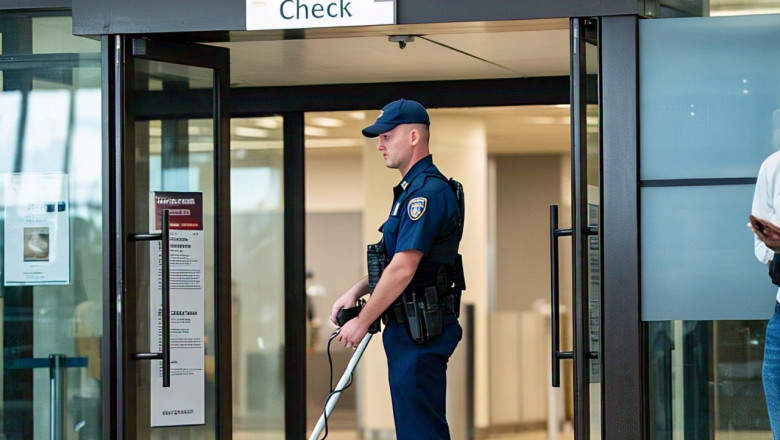views
Introduction to Airport Security
Airports are critical infrastructure points requiring top-tier security. With the continuous flow of passengers, staff, and cargo, ensuring security is a complex task. This is where trained security guards play a central role. They work hand-in-hand with aviation authorities to deter threats, manage crowds, and maintain a secure environment. Their constant presence not only enhances safety but also boosts public confidence in air travel.
Why Airport Security Needs Professional Guards
Given the heightened risks in aviation, including terrorism, smuggling, and unauthorized access, airports demand trained professionals. Security guards serve as the first line of defense. Their training allows them to detect suspicious behavior, handle disruptions, and respond to emergencies. Without their vigilant eyes and quick action, airports could become vulnerable targets.
Access Control: The First Barrier Against Threats
Security guards regulate access to sensitive areas like control towers, baggage handling zones, and runways. This access control prevents unauthorized entry, reducing potential risks. Guards ensure only authorized personnel can enter restricted zones, often through ID checks, biometric verification, and vehicle screening.
Surveillance Monitoring and CCTV Coordination
One of the primary tasks of airport security personnel is real-time monitoring of surveillance systems. By observing CCTV footage, they can detect irregularities, track suspicious individuals, and assist law enforcement if needed. Their collaboration with technical teams ensures that surveillance translates into immediate action.
Crowd Management During Peak Hours
Airports often experience high passenger traffic, especially during holidays or major events. Security guards help maintain order during these peak times. From managing queues to addressing disputes, they ensure passengers move smoothly through security checkpoints without chaos or delays.
Screening Support and Baggage Checks
While screening is typically the job of TSA or similar authorities, security guards provide vital assistance. They help maintain order, assist travelers unfamiliar with procedures, and offer support during manual baggage checks. Their presence ensures that the screening area remains efficient and conflict-free.
Handling Suspicious Behavior
Trained guards are skilled in behavior detection. They observe for nervousness, avoidance, or erratic actions among passengers. If needed, they intervene discretely or report the issue to airport police. This proactive approach is crucial for early threat identification.
Emergency Response and Evacuation Management
In times of crisis—whether it's a fire alarm, medical emergency, or bomb threat—security guards step in immediately. They help direct crowds to safe zones, communicate with emergency responders, and enforce evacuation protocols. Their calm and controlled demeanor helps minimize panic.
Assisting Disabled and Elderly Passengers
Security guards often assist vulnerable travelers, including the elderly and disabled. From helping with wheelchairs to offering directions, their assistance ensures all passengers have a comfortable and secure airport experience. This role reflects their commitment to safety and service.
Supporting Law Enforcement Operations
Security personnel often work in tandem with police and aviation security agencies. During investigations or heightened alerts, they support perimeter security, gather evidence, or assist in search operations. Their knowledge of the airport layout and protocols is invaluable in joint operations.
Static Security Guards: Maintaining a Constant Presence
Static security guards provide continuous protection in fixed positions like airport entrances, gates, or hangars. Their presence deters criminal activity and ensures swift responses. By maintaining these fixed posts, guards form the backbone of daily airport security operations. For a deeper understanding of how static guards operate in high-security environments, you can learn more through this overview of comprehensive airport static guarding services: static security responsibilities at airports.
The Role of Patrolling Guards in Perimeter Security
Besides static roles, patrolling guards monitor airport perimeters, parking areas, and cargo zones. They look for breaches, abandoned items, or unauthorized vehicles. These mobile teams help cover wider areas and prevent any blind spots in security coverage.
Training and Certification Requirements
Security guards working in airports must meet strict training standards. This includes conflict resolution, counter-terrorism awareness, first aid, and communication skills. Continuous training ensures that they remain updated on new threats and technological tools used in modern airports.
Role in Cargo and Freight Security
Guards also monitor cargo operations to prevent smuggling or sabotage. With high-value shipments and international trade flowing through airports, cargo zones are prime targets. Security personnel help inspect packages, supervise loading, and check access to cargo bays.
Enhancing Passenger Confidence Through Visible Security
Passengers feel more secure when they see uniformed guards in action. Whether patrolling terminals or monitoring entrances, their visible presence acts as a psychological deterrent to crime. It also reassures travelers that their safety is taken seriously.
Leveraging Private Security Providers
Airports often collaborate with private security agencies for flexible, scalable support. These agencies provide guards who are specially trained for aviation environments. Working with a reliable security guard company in Australia ensures that airports get highly professional teams to address their unique needs. Explore how tailored security services can uplift airport safety through this expert airport security provider.
FAQs
1. What are the primary duties of airport security guards?
They handle access control, surveillance, crowd management, and emergency response.
2. Are airport security guards allowed to detain suspects?
Yes, they can detain individuals until law enforcement arrives, especially in security breach cases.
3. How do guards detect suspicious behavior?
They rely on training in behavioral analysis, body language, and situational awareness.
4. Do security guards work with airport police?
Absolutely. They often assist in investigations, joint patrols, and threat response.
5. Can private companies provide airport security?
Yes, many airports hire private security services to enhance their internal teams.
6. What qualifications do airport security guards need?
They need accredited security training, background checks, and sometimes aviation-specific certifications.














Comments
0 comment